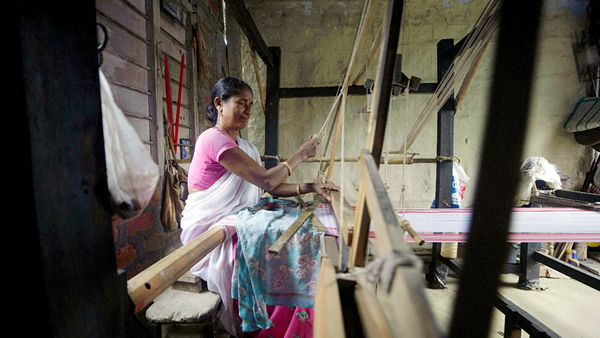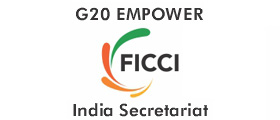Renu Barua was born in 1980, in an impoverished family that could not make ends meet most days. But she was fortunate that despite their poverty, her parents supported her dreams and did not rush her into marriage. She also married into a prosperous and supportive household in 2004.
“No sooner had I moved to my new home after marriage, than my husband helped me buy a handloom machine. After some years, he even brought me a jacquard machine that enabled me to create new designs on the fabrics,” she says. “We started a Self Help Group with ten women and started weaving gamchas.”[1]
It all went very well and, soon, once demand peaked, as part of the support from the State Rural Livelihoods Mission and NABARD, Renu was ready to take a loan of INR 45,000 to purchase her second handloom machine.
Renu also trained herself in multiple aspects of sustainable livelihoods taking advantage of various skill-building programmes that were being offered by the Rashtriya Grameen Vikas Nidhi, an NGO that worked in the area. She even worked as an Animator with eShakti, a customised apparel designing brand.
“Working with her as part of the SHG, I have seen my income double in the last few years. She received the training as a Master Trainer and in turn imparted the training to us. This has given us better skills and our products an edge in the local market,” says Pranati Deka, a member of Renu’s SHG.
“We are hungry for training in better designs so that our products can fetch better prices. We want access to modern technology for weaving so that our productivity increases and so does our income,” she says.
Renu says until recently, she would create designs with her own hands. “With machine-based training, we are able to create many more designs that can be easily replicated almost like a fax machine. It adds precision in the design and leads to a much faster completion of the products,” she says.
In the neighbouring village of Bhuktabari in Sipajhar Gram Panchayat, Hema Prabha hit hard times when her husband suffered a brain stroke and ended up with a chronic lung disease in 2018 that drained the family resources. Hema received a loan under the Assam Government’s Svayem Scheme that advanced loans to new entrepreneurs. “With the loan, I bought a loom and thanks to a revolving grant of 25,000 rupees under the State Rural Livelihoods Mission, I set up a micro enterprise which would generate both regular revenue and small profits as well.”
Hema’s small enterprise now has 10 looms. Each woman makes two gamchas a day and a piece of Mekhala, the Assamese women’s traditional attire. Through eShakti, the women had the opportunity to interact with 300 more women from 30 SHGs and exchange design ideas and innovative use of raw materials.
“I am happy with the little I have managed to achieve,” she says. “I hope other women can have the same opportunities to become financially independent, too.”
 |
 |
These stories of women-led development have been compiled by UN Women India. All copyrights to the stories and images are held by UN Women India Country Office dated December 2022. |

